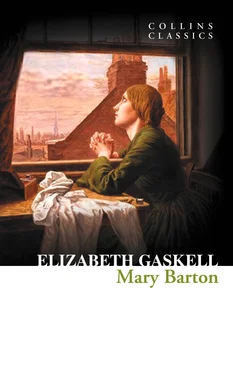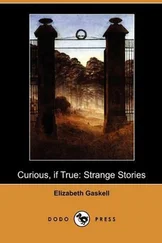An idea was now springing up among the operatives, that originated with the Chartists, but which came at last to be cherished as a darling child by many and many a one. They could not believe that Government knew of their misery: they rather chose to think it possible that men could voluntarily assume the office of legislators for a nation who were ignorant of its real state; as who should make domestic rules for the pretty behaviour of children without caring to know that those children had been kept for days without food. Besides, the starving multitudes had heard, that the very existence of their distress had been denied in Parliament; and though they felt this strange and inexplicable, yet the idea that their misery had still to be revealed in all its depths, and that then some remedy would be found, soothed their aching hearts, and kept down their rising fury.
So a petition was framed, and signed by thousands in the bright spring days of 1839, imploring Parliament to hear witnesses who could testify to the unparalleled destitution of the manufacturing districts. Nottingham, Sheffield, Glasgow, Manchester, and many other towns, were busy appointing delegates to convey this petition, who might speak, not merely of what they had seen, and had heard, but from what they had borne and suffered. Life-worn, gaunt, anxious, hunger-stamped men, were those delegates.
One of them was John Barton. He would have been ashamed to own the flutter of spirits his appointment gave him. There was the childish delight of seeing London – that went a little way, and but a little way. There was the vain idea of speaking out his notions before so many grand folk – that went a little further; and last, there was the really pure gladness of heart arising from the idea that he was one of those chosen to be instruments in making known the distresses of the people, and consequently in procuring them some grand relief, by means of which they should never suffer want or care any more. He hoped largely, but vaguely, of the results of his expedition. An argosy of the precious hopes of many otherwise despairing creatures, was that petition to be heard concerning their sufferings.
The night before the morning on which the Manchester delegates were to leave for London, Barton might be said to hold a levée, so many neighbours came dropping in. Job Legh had early established himself and his pipe by John Barton’s fire, not saying much, but puffing away, and imagining himself of use in adjusting the smoothing-irons that hung before the fire, ready for Mary when she should want them. As for Mary, her employment was the same as that of Beau Tibbs’ wife, ‘just washing her father’s two shirts,’ in the pantry back-kitchen; for she was anxious about his appearance in London. (The coat had been redeemed, though the silk handkerchief was forfeited.) The door stood open, as usual, between the house-place and back-kitchen, so she gave her greeting to their friends as they entered.
‘So, John, yo’re bound for London, are yo?’ said one.
‘Ay, I suppose I mun go,’ answered John, yielding to necessity as it were.
‘Well, there’s many a thing I’d like yo to speak on to the Parliament people. Thou’lt not spare ’em, John, I hope. Tell ’em our minds; how we’re thinking we’n been clemmed long enough, and we donnot see whatten good they’n been doing, if they can’t give us what we’re all crying for sin’ the day we were born.’
‘Ay, ay! I’ll tell ’em that, and much more to it, when it gets to my turn; but thou knows there’s many will have their word afore me.’
‘Well, thou’lt speak at last. Bless thee, lad, do ask ’em to make th’ masters to break th’ machines. There’s never been good times sin’ spinning-jennies came up.’
‘Machines is th’ ruin of poor folk,’ chimed in several voices.
‘For my part,’ said a shivering, half-clad man, who crept near the fire, as if ague-stricken, ‘I would like thee to tell ’em to pass th’ Short-hours Bill. Flesh and blood get wearied wi’ so much work; why should factory hands work so much longer nor other trades? Just ask ’em that, Barton, will ye?’
Barton was saved the necessity of answering, by the entrance of Mrs Davenport, the poor widow he had been so kind to; she looked half-fed, and eager, but was decently clad. In her hand she brought a little newspaper parcel, which she took to Mary, who opened it, and then called out, dangling a shirt collar from her soapy fingers:
‘See, father, what a dandy you’ll be in London! Mrs Davenport has brought you this; made new cut, all after the fashion. Thank you for thinking on him.’
‘Eh, Mary!’ said Mrs Davenport in a low voice, ‘whatten’s all I can do, to what he’s done for me and mine? But, Mary, sure I can help ye, for you’ll be busy wi’ this journey.’
‘Just help me wring these out, and then I’ll take ’em to the mangle.’
So Mrs Davenport became a listener to the conversation; and after a while joined in.
‘I’m sure, John Barton, if yo are taking messages to the Parliament folk, yo’ll not object to telling ’em what a sore trial it is, this law o’ theirs, keeping childer fra’ factory work, whether they be weakly or strong. There’s our Ben: why, porridge seems to go no way wi’ him, he eats so much; and I han gotten no money to send him t’ school, as I would like; and there he is, rampaging about the streets a’ day, getting hungrier and hungrier, and picking up a’ manner o’ bad ways; and th’ inspector won’t let him in to work in th’ factory, because he’s not right age; though he’s twice as strong as Sankey’s little ritling * of a lad, as works till he cries for his legs aching so, though he is right age, and better.’
‘I’ve one plan I wish to tell John Barton,’ said a pompous, careful-speaking man, ‘and I should like him for to lay it afore the Honourable House. My mother comed out o’ Oxfordshire, and were underlaundry-maid in Sir Francis Dashwood’s family; and when we were little ones, she’d tell us stories of their grandeur: and one thing she named were, that Sir Francis wore two shirts a day. Now he were all as one as a Parliament man; and many on ’em, I han no doubt, are like extravagant. Just tell ’em, John, do, that they’d be doing the Lancashire weavers a great kindness, if they’d ha’ their shirts a’ made o’ calico; ’twould make trade brisk, that would, wi’ the power o’ shirts they wear.’
Job Legh now put in his word. Taking the pipe out of his mouth, and addressing the last speaker, he said:
‘I’ll tell ye what, Bill, and no offence, mind ye; there’s but hundreds of them Parliament folk as wear so many shirts to their back; but there’s thousands and thousands o’ poor weavers as han only gotten one shirt i’ the world; ay, and don’t know where t’ get another when that rag’s done, though they’re turning out miles o’ calico every day; and many a mile o’t is lying in warehouses, stopping up trade for want o’ purchasers. Yo take my advice, John Barton, and ask Parliament to set trade free, so as workmen can earn a decent wage, and buy their two, ay and three, shirts a year; that would make weaving brisk.’
He put his pipe in his mouth again, and redoubled his puffing, to make up for lost time.
‘I’m afeard, neighbours,’ said John Barton, ‘I’ve not much chance o’ telling ’em all yo say; what I think on, is just speaking out about the distress that they say is nought. When they hear o’ children born on wet flags, without a rag t’ cover ’em or a bit o’ food for th’ mother; when they hear of folk lying down to die i’ th’ streets, or hiding their want i’ some hole o’ a cellar till death come to set ’em free; and when they hear o’ all this plague, pestilence, and famine, they’ll surely do somewhat wiser for us than we can guess at now. Howe’er, I han no objection, if so be there’s an opening, to speak up for what yo say; anyhow, I’ll do my best, and yo see now, if better times don’t come after Parliament knows all.’
Читать дальше












